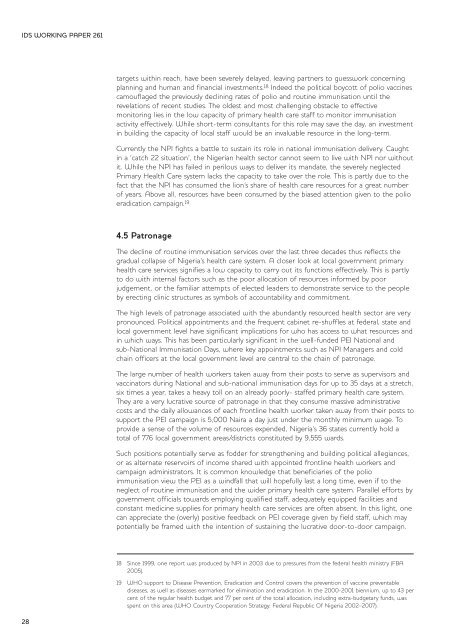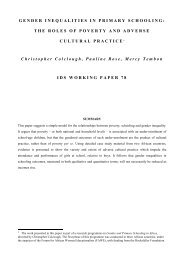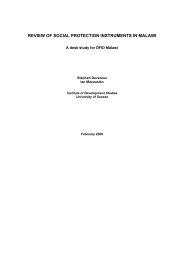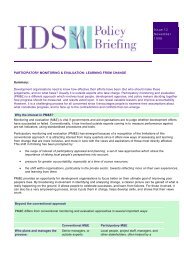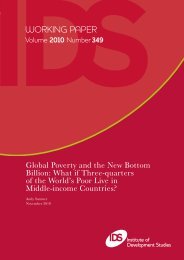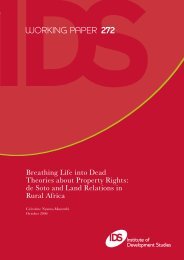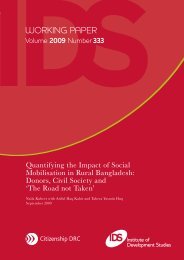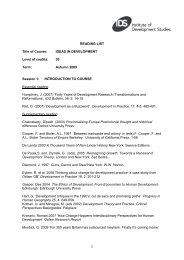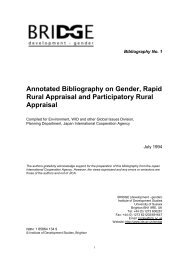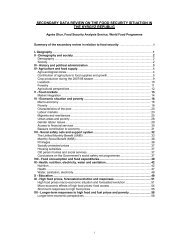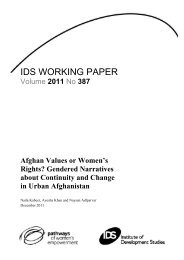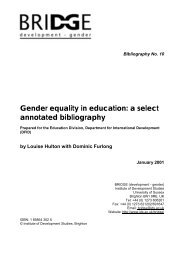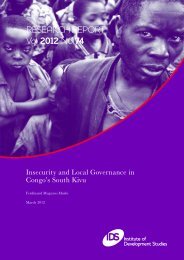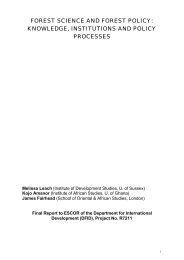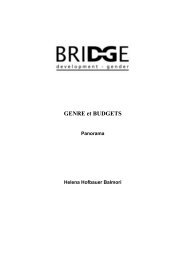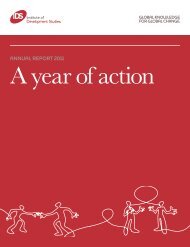WORKING PAPER 261 - Institute of Development Studies
WORKING PAPER 261 - Institute of Development Studies
WORKING PAPER 261 - Institute of Development Studies
Create successful ePaper yourself
Turn your PDF publications into a flip-book with our unique Google optimized e-Paper software.
IDS <strong>WORKING</strong> <strong>PAPER</strong> <strong>261</strong><br />
targets within reach, have been severely delayed, leaving partners to guesswork concerning<br />
planning and human and financial investments. 18 Indeed the political boycott <strong>of</strong> polio vaccines<br />
camouflaged the previously declining rates <strong>of</strong> polio and routine immunisation until the<br />
revelations <strong>of</strong> recent studies. The oldest and most challenging obstacle to effective<br />
monitoring lies in the low capacity <strong>of</strong> primary health care staff to monitor immunisation<br />
activity effectively. While short-term consultants for this role may save the day, an investment<br />
in building the capacity <strong>of</strong> local staff would be an invaluable resource in the long-term.<br />
Currently the NPI fights a battle to sustain its role in national immunisation delivery. Caught<br />
in a ‘catch 22 situation’, the Nigerian health sector cannot seem to live with NPI nor without<br />
it. While the NPI has failed in perilous ways to deliver its mandate, the severely neglected<br />
Primary Health Care system lacks the capacity to take over the role. This is partly due to the<br />
fact that the NPI has consumed the lion’s share <strong>of</strong> health care resources for a great number<br />
<strong>of</strong> years. Above all, resources have been consumed by the biased attention given to the polio<br />
eradication campaign. 19<br />
4.5 Patronage<br />
The decline <strong>of</strong> routine immunisation services over the last three decades thus reflects the<br />
gradual collapse <strong>of</strong> Nigeria’s health care system. A closer look at local government primary<br />
health care services signifies a low capacity to carry out its functions effectively. This is partly<br />
to do with internal factors such as the poor allocation <strong>of</strong> resources informed by poor<br />
judgement, or the familiar attempts <strong>of</strong> elected leaders to demonstrate service to the people<br />
by erecting clinic structures as symbols <strong>of</strong> accountability and commitment.<br />
The high levels <strong>of</strong> patronage associated with the abundantly resourced health sector are very<br />
pronounced. Political appointments and the frequent cabinet re-shuffles at federal, state and<br />
local government level have significant implications for who has access to what resources and<br />
in which ways. This has been particularly significant in the well-funded PEI National and<br />
sub-National Immunisation Days, where key appointments such as NPI Managers and cold<br />
chain <strong>of</strong>ficers at the local government level are central to the chain <strong>of</strong> patronage.<br />
The large number <strong>of</strong> health workers taken away from their posts to serve as supervisors and<br />
vaccinators during National and sub-national immunisation days for up to 35 days at a stretch,<br />
six times a year, takes a heavy toll on an already poorly- staffed primary health care system.<br />
They are a very lucrative source <strong>of</strong> patronage in that they consume massive administrative<br />
costs and the daily allowances <strong>of</strong> each frontline health worker taken away from their posts to<br />
support the PEI campaign is 5,000 Naira a day just under the monthly minimum wage. To<br />
provide a sense <strong>of</strong> the volume <strong>of</strong> resources expended, Nigeria’s 36 states currently hold a<br />
total <strong>of</strong> 776 local government areas/districts constituted by 9,555 wards.<br />
Such positions potentially serve as fodder for strengthening and building political allegiances,<br />
or as alternate reservoirs <strong>of</strong> income shared with appointed frontline health workers and<br />
campaign administrators. It is common knowledge that beneficiaries <strong>of</strong> the polio<br />
immunisation view the PEI as a windfall that will hopefully last a long time, even if to the<br />
neglect <strong>of</strong> routine immunisation and the wider primary health care system. Parallel efforts by<br />
government <strong>of</strong>ficials towards employing qualified staff, adequately equipped facilities and<br />
constant medicine supplies for primary health care services are <strong>of</strong>ten absent. In this light, one<br />
can appreciate the (overly) positive feedback on PEI coverage given by field staff, which may<br />
potentially be framed with the intention <strong>of</strong> sustaining the lucrative door-to-door campaign.<br />
18 Since 1999, one report was produced by NPI in 2003 due to pressures from the federal health ministry (FBA<br />
2005).<br />
19 WHO support to Disease Prevention, Eradication and Control covers the prevention <strong>of</strong> vaccine preventable<br />
diseases, as well as diseases earmarked for elimination and eradication. In the 2000-2001 biennium, up to 43 per<br />
cent <strong>of</strong> the regular health budget and 77 per cent <strong>of</strong> the total allocation, including extra-budgetary funds, was<br />
spent on this area (WHO Country Cooperation Strategy: Federal Republic Of Nigeria 2002–2007).<br />
28


